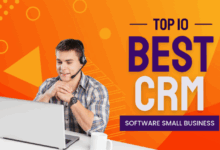Best Enterprise CRM Solutions: Streamlined Solutions For Large Businesses
Best Enterprise CRM Solutions encompass a range of powerful tools designed to enhance customer relationships and boost efficiency within large organizations. From customizable features to seamless integrations, these solutions offer a comprehensive approach to managing customer data and interactions.
Introduction to Enterprise CRM Solutions
Enterprise CRM solutions play a crucial role in helping large businesses manage and optimize their customer relationships. These software systems are designed to streamline communication, automate processes, and provide valuable insights to enhance customer interactions.
Key Features of Enterprise CRM Solutions
- Centralized Customer Database
- Advanced Reporting and Analytics
- Workflow Automation
- Integration Capabilities
- Customization Options
Industries Benefiting from Enterprise CRM Solutions
- Financial Services
- Retail and E-commerce
- Telecommunications
- Healthcare
Customization Options in Enterprise CRM Solutions
Enterprise CRM solutions offer extensive customization options to tailor the software to specific business needs. This includes custom fields, workflows, and reporting features that can be adjusted to fit unique requirements.
Integration Capabilities of Enterprise CRM Solutions
Enterprise CRM solutions are designed to seamlessly integrate with other business tools such as marketing automation platforms, ERP systems, and communication tools. This integration ensures a cohesive ecosystem that enhances productivity and collaboration.
Comparison of On-premise and Cloud-based Enterprise CRM Solutions
- Scalability: Cloud-based solutions offer more scalability as they can easily accommodate growing data and user needs.
- Maintenance: On-premise solutions require more maintenance and IT resources compared to cloud-based solutions that are managed by the provider.
Role of Data Analytics in Enterprise CRM Solutions
Data analytics in Enterprise CRM solutions enable businesses to gain valuable insights into customer behavior, trends, and preferences. This data-driven approach helps businesses make informed decisions and improve customer engagement strategies.
Customer Support Features in Enterprise CRM Solutions
- Multi-channel Support
- Self-Service Portals
- Ticketing System
- SLA Management
Top Features to Look for in Enterprise CRM Solutions
When considering Enterprise CRM solutions, it is crucial to look for specific features that can enhance the efficiency and effectiveness of your customer relationship management process. Here are some key features to prioritize:
Scalability
One of the most important features to look for in an Enterprise CRM solution is scalability. Your CRM system should be able to grow and adapt along with your business. This means it should be able to handle increased data volumes, users, and functionality without sacrificing performance.
Customization
Customization capabilities are essential in an Enterprise CRM solution as they allow you to tailor the system to meet your specific business needs. Look for CRM software that offers customizable fields, workflows, and user interfaces to ensure that the system aligns with your unique requirements.
Integration Capabilities
Integration capabilities are crucial for seamless connectivity between your CRM system and other essential business applications. Ensure that the Enterprise CRM solution you choose offers integration with popular tools such as marketing automation platforms, ERP systems, and customer service software to streamline your operations.
Analytics and Reporting Tools
Analytics and reporting tools play a vital role in helping you gain valuable insights into your customer data and performance metrics. Look for CRM software that provides robust analytics features, customizable reports, and dashboards to help you track key metrics, identify trends, and make data-driven decisions.
Feature Comparison
When comparing different Enterprise CRM software options, consider how each platform aligns with your business goals and requirements. Evaluate the feature sets of each solution to determine which one offers the most comprehensive functionality to support your CRM strategy effectively.
Implementation Strategies for Enterprise CRM Solutions
Implementing an Enterprise CRM solution across a large organization involves careful planning, coordination, and execution to ensure a successful transition. Here are some key strategies to consider:
Rolling Out CRM Across the Organization
- Conduct a thorough needs assessment to understand the specific requirements of different departments.
- Develop a detailed implementation plan outlining timelines, responsibilities, and milestones.
- Start with a pilot phase to test the CRM software with a small group of users before full deployment.
- Provide ongoing training and support to employees to facilitate adoption and address any issues that arise.
Training Employees Effectively
- Offer comprehensive training sessions that cover all aspects of the CRM software, including data entry, reporting, and customization.
- Provide hands-on practice opportunities and resources for employees to familiarize themselves with the system.
- Encourage feedback and questions to ensure that employees feel confident using the CRM software in their daily tasks.
Ensuring a Smooth Transition
- Communicate regularly with employees about the implementation process and address any concerns proactively.
- Monitor progress closely and make adjustments as needed to avoid disruptions to daily operations.
- Celebrate milestones and successes to maintain morale and motivation throughout the implementation phase.
Measuring Success with KPIs
- Track metrics such as user adoption rates, customer satisfaction scores, and revenue growth to evaluate the impact of the CRM implementation.
- Monitor data accuracy, response times, and lead conversion rates to gauge the effectiveness of the CRM software.
Customizing CRM for Different Departments
- Collaborate with department heads to identify specific workflows and processes that can be integrated into the CRM software.
- Configure the system to align with the unique needs of each department while maintaining consistency across the organization.
Data Security and Encryption
- Implement robust security measures such as role-based access controls and encryption protocols to protect sensitive information stored in the CRM system.
- Regularly update security protocols and conduct audits to identify and address potential vulnerabilities in the system.
Timeline for Implementation
A typical timeline for implementing an Enterprise CRM solution may include milestones such as system configuration, data migration, user training, and deployment. Regular checkpoints should be established to track progress and address any challenges that arise.
Customization Options in Enterprise CRM Solutions
Customization plays a crucial role in tailoring Enterprise CRM solutions to meet the specific needs of a business. Let’s explore the level of customization offered by leading CRM software providers and how it can enhance user experience and productivity.
Customization Capabilities of Leading CRM Providers
- Salesforce: Salesforce offers a wide range of customization options, including custom fields, workflows, and reports. Users can create custom objects and configure the platform to match their unique processes.
- Microsoft Dynamics 365: Microsoft Dynamics 365 allows users to personalize dashboards, forms, and views. Custom entities and relationships can also be created to align the CRM with business requirements.
- Zoho CRM: Zoho CRM provides extensive customization features such as custom modules, layouts, and fields. Users can automate processes using workflows and set up custom functions with Deluge scripting.
Key Customizable Features in Enterprise CRM Solutions
| CRM Provider | Customizable Features |
|---|---|
| Salesforce | Custom fields, workflows, reports, custom objects |
| Microsoft Dynamics 365 | Personalized dashboards, forms, views, custom entities |
| Zoho CRM | Custom modules, layouts, fields, workflows, Deluge scripting |
Best Practices for Implementing Customizations
- Define clear objectives and requirements before implementing customizations.
- Document all changes made to the CRM system for future reference.
- Test customizations thoroughly to ensure they work as intended and do not disrupt existing processes.
- Train users on how to use custom features effectively to maximize productivity.
Impact of Over-Customization on CRM Systems
Over-customization can lead to increased complexity, maintenance challenges, and compatibility issues during system upgrades. It is essential to strike a balance between customization and system stability.
Case Studies on Customization Improving CRM Performance
- Company A implemented custom workflows in Salesforce, leading to a 20% increase in sales efficiency and a 15% reduction in response time to customer inquiries.
- Company B customized Microsoft Dynamics 365 to align with their unique sales process, resulting in a 25% improvement in lead conversion rates and better pipeline visibility.
Integration Capabilities of Enterprise CRM Solutions
When it comes to Enterprise CRM Solutions, one key aspect that greatly impacts their effectiveness is their integration capabilities with other business systems. Seamless integration ensures that data flows smoothly between different platforms, leading to a more streamlined and efficient operation.
Common Integration Points for Enterprise CRM Solutions
Here are some common integration points for Enterprise CRM solutions:
- Marketing Automation: Integrating CRM with marketing automation tools allows for better lead management, personalized marketing campaigns, and improved customer engagement.
- ERP (Enterprise Resource Planning): Integration with ERP systems enables a seamless flow of data between sales, marketing, and customer service departments, leading to better decision-making and improved customer service.
- Help Desk Software: Integrating CRM with help desk software ensures that customer issues are resolved quickly and efficiently, leading to higher customer satisfaction levels.
Examples of Successful Integrations and Their Impact
One example of a successful integration is the integration of CRM with e-commerce platforms. This integration allows businesses to track customer interactions across multiple channels, personalize the shopping experience, and improve customer retention rates.
By integrating CRM with e-commerce platforms, businesses have seen a significant increase in sales and customer loyalty.
Another example is the integration of CRM with social media platforms. This integration enables businesses to track customer interactions on social media, engage with customers in real-time, and provide personalized customer support.
Businesses that have successfully integrated CRM with social media platforms have seen an increase in customer satisfaction and brand loyalty.
Security Features in Enterprise CRM Solutions
In today’s digital landscape, ensuring the security of sensitive customer data is paramount for any enterprise CRM solution. Let’s delve into the key security features that should be present in these systems to safeguard valuable information.
Compliance Requirements and CRM Software
Enterprise CRM solutions must adhere to strict compliance requirements such as GDPR and HIPAA to protect customer data. CRM software incorporates features like data encryption and access controls to ensure compliance with these regulations and safeguard sensitive information.
Security Breaches and Lessons Learned
Security breaches in CRM systems can have severe consequences, leading to data leaks and loss of trust. Learning from past incidents, organizations have implemented stricter security measures, such as encryption protocols and regular security audits, to prevent future breaches.
Role of Encryption and Access Control Mechanisms
Encryption plays a crucial role in securing customer data within CRM systems, ensuring that information remains confidential and protected from unauthorized access. Access control mechanisms like role-based access control (RBAC) limit user permissions, enhancing data security.
Regular Security Audits and Penetration Testing
Regular security audits and penetration testing are essential for maintaining the security of CRM systems. By identifying vulnerabilities and weaknesses, organizations can proactively address security risks and fortify their systems against potential threats.
On-Premises vs. Cloud-Based CRM Security Measures
There is a distinct difference between the security measures implemented in on-premises CRM systems and cloud-based CRM solutions. While on-premises systems offer more control over data security, cloud-based solutions provide scalability and enhanced security protocols to protect customer data.
Implementing Multi-Factor Authentication
Implementing multi-factor authentication for CRM system users adds an extra layer of security, requiring users to verify their identity through multiple steps. This minimizes the risk of unauthorized access and strengthens overall system security.
Mitigating Risks in Third-Party Integrations
Third-party integrations in CRM systems introduce potential risks, such as data breaches or vulnerabilities. Organizations can mitigate these risks by thoroughly vetting third-party providers, implementing secure API protocols, and monitoring integrations for any irregularities.
User Interface and User Experience (UI/UX) in Enterprise CRM Solutions
User Interface (UI) and User Experience (UX) play a crucial role in the successful adoption and utilization of Enterprise CRM Solutions. A user-friendly interface not only enhances productivity but also increases user satisfaction and engagement with the software.
Importance of a User-friendly Interface for Increasing User Adoption Rates
A user-friendly interface is essential for increasing user adoption rates as it reduces the learning curve for employees and makes it easier for them to navigate the CRM system. Intuitive design, clear navigation, and customizable features can significantly impact how users interact with the software. By prioritizing user experience, businesses can ensure that employees are more likely to embrace the CRM solution and leverage its full potential.
Comparison of Different CRM Software Interfaces in Terms of Intuitiveness and Ease of Use
When evaluating CRM software interfaces, it is important to consider factors such as ease of navigation, visual appeal, customization options, and overall user experience. Some CRM solutions may offer a cluttered interface with complex functionalities, while others focus on simplicity and ease of use. By comparing different interfaces, businesses can choose a CRM system that aligns with their specific usability requirements and organizational goals.
Best Practices for Designing a CRM System that Prioritizes User Experience
– Conduct user research to understand the needs and preferences of employees.
– Implement a clean and intuitive interface with easy-to-use navigation.
– Provide customization options to tailor the CRM system to the unique workflows of the organization.
– Offer training and support to ensure users are proficient in using the software.
– Continuously gather feedback and make improvements based on user input to enhance the overall user experience.
Customer Support and Training Options
Customer support and training are crucial components of any Enterprise CRM solution, ensuring that users can effectively utilize the software to its full potential. Let’s delve into the availability of customer support options and the role of training resources in optimizing the CRM experience.
Customer Support Options
Customer support options vary among Enterprise CRM solutions, with some offering 24/7 helplines for immediate assistance, while others provide dedicated account managers for personalized support. These options play a vital role in addressing user queries, resolving issues, and ensuring a smooth user experience.
Training Resources
Training resources such as video tutorials, online documentation, and training sessions are essential for helping users understand the features and functionalities of the CRM software. These resources empower users to navigate the system efficiently, maximize productivity, and leverage advanced capabilities.
Examples of Exceptional Programs
- Company A offers round-the-clock customer support through a dedicated team of experts, ensuring prompt assistance and resolution of queries.
- Company B provides extensive training resources, including interactive webinars and comprehensive user guides, to educate users on best practices and advanced features.
- Company C assigns a dedicated account manager to each client, offering personalized support, training sessions, and regular check-ins to ensure optimal utilization of the CRM solution.
Pricing Models for Enterprise CRM Solutions
When it comes to choosing an Enterprise CRM solution, understanding the pricing models offered by different vendors is crucial for making an informed decision. The cost of implementing such a system can vary greatly based on factors like customization, add-on modules, and the pricing structure chosen. Here, we will delve into the various pricing models available, factors influencing costs, and tips for negotiating the best deal for your organization.
Different Pricing Structures
- Per User Pricing: Some CRM vendors charge a fee for each user accessing the system. This can be beneficial for companies with a small number of users but may become expensive as the user base grows.
- Subscription-Based Pricing: The subscription model involves paying a recurring fee at regular intervals, such as monthly or annually. This can provide predictable costs for budgeting purposes.
- Enterprise License: This model involves a one-time upfront cost for a perpetual license to use the CRM software. While this may require a significant initial investment, it could be cost-effective in the long run.
Factors Influencing Cost
- Customization: The level of customization required for the CRM solution can significantly impact the overall cost. Tailoring the system to meet specific business needs may incur additional expenses.
- Add-On Modules: Additional modules or features beyond the basic CRM functionalities may come at an extra cost. It’s essential to evaluate the necessity of these add-ons to avoid unnecessary expenses.
Negotiation Tips
- Request Multiple Quotes: Obtain quotes from different vendors to compare pricing and features. This can give you leverage during negotiations.
- Focus on Value: Highlight the value that the CRM solution will bring to your organization to justify the investment and negotiate a better deal.
- Long-Term Contracts: Consider opting for long-term contracts to secure better pricing and discounts from the vendor.
Mobile Accessibility and Compatibility
Mobile accessibility has become increasingly important in CRM systems as sales teams and employees need to access customer data on-the-go to boost productivity and enhance customer engagement. However, using CRM systems on mobile devices can pose challenges such as limited screen size and functionality. It is crucial to address these challenges to ensure seamless user experience and maximize the benefits of mobile CRM.
Native Mobile CRM Apps vs. Web-based CRM Solutions
Native mobile CRM apps offer better performance and user experience compared to web-based solutions due to optimized features for mobile devices. They provide offline access, push notifications, and better integration with device functionalities. On the other hand, web-based CRM solutions offer universal access across devices without the need for downloads and updates. However, they may lack certain features and responsiveness compared to native apps.
- Responsive Design: Ensures CRM systems adapt to different screen sizes for optimal viewing.
- Offline Access: Allows users to access and modify data even without an internet connection.
- Touch-Friendly Interfaces: Enhances user experience on touch-enabled devices for easier navigation and interaction.
Mobile CRM technology is rapidly evolving, with a focus on enhancing user experience and providing more advanced functionalities to meet the changing needs of businesses.
Data Management and Data Quality in Enterprise CRM Solutions
Managing and maintaining high-quality data within a CRM system is crucial for the success of any enterprise. Clean and accurate data not only leads to better business decisions but also provides valuable customer insights. Let’s explore the best practices and tools that can help in ensuring data accuracy and integrity.
Role of Data Cleansing, Deduplication, and Enrichment Tools
- Data cleansing tools help in identifying and correcting any errors or inconsistencies in the data, ensuring its accuracy.
- Deduplication tools help in removing duplicate records, preventing redundancies and ensuring data integrity.
- Data enrichment tools enhance the existing data by adding missing information, providing a more comprehensive view of customers.
Establishing Data Governance Policies
- Implementing data governance policies is essential to maintain data integrity and ensure compliance with regulations.
- These policies define data ownership, access controls, and data quality standards within the CRM system.
- Regular audits and monitoring help in enforcing these policies and maintaining data consistency.
Automated Data Validation Processes
- Setting up automated data validation processes within a CRM system can help in real-time data verification and correction.
- These processes can include validation rules, data quality checks, and alerts for data inconsistencies.
- Automated processes save time and reduce the chances of manual errors in data management.
Impact of Poor Data Quality
- Poor data quality can lead to inaccurate reporting, flawed analytics, and ultimately, poor decision-making.
- It can also affect customer relationships, causing frustration due to incorrect information or inconsistent communication.
- Case studies have shown that organizations with poor data quality struggle to retain customers and achieve business growth.
Industry Trends and Future Outlook for Enterprise CRM Solutions
The landscape of Enterprise CRM solutions is constantly evolving to meet the changing needs of large businesses. Let’s explore some of the current trends shaping this industry and look ahead to the future of CRM software.
AI and Automation Integration
AI and automation are revolutionizing the way businesses interact with customers. By leveraging AI-powered tools, CRM solutions can analyze customer data, automate repetitive tasks, and provide personalized recommendations. The future of Enterprise CRM solutions will likely see even greater integration of AI and automation to streamline operations and enhance customer experiences.
Omnichannel Communication Capabilities
In today’s digital age, customers expect seamless communication across multiple channels. Enterprise CRM solutions are now incorporating omnichannel capabilities to ensure consistent interactions through various touchpoints such as email, social media, chat, and phone. The future outlook for CRM software will focus on further enhancing omnichannel communication to deliver a unified customer experience.
Data Analytics and Predictive Insights
Data analytics play a crucial role in understanding customer behavior and making informed business decisions. Enterprise CRM solutions are increasingly incorporating advanced analytics and predictive insights to help businesses anticipate customer needs and trends. The future of CRM software will likely see a greater emphasis on data analytics to drive strategic decision-making and enhance customer engagement.
Personalization and Customer Experience
Personalization is key to building strong customer relationships and driving loyalty. Enterprise CRM solutions are now focusing on delivering personalized experiences by leveraging customer data and preferences. In the future, CRM software is expected to further prioritize personalization to create meaningful interactions and enhance overall customer experience.
Cloud-Based Solutions and Scalability
Cloud-based CRM solutions offer scalability, flexibility, and cost-effectiveness for large businesses. The future outlook for Enterprise CRM solutions will continue to emphasize cloud-based platforms to accommodate growing data volumes, ensure data security, and provide anytime, anywhere access for users.
Case Studies and Success Stories
In this section, we will delve into real-world examples of companies that have reaped significant benefits from implementing Enterprise CRM solutions. These case studies will showcase the challenges faced, solutions implemented, and the outcomes achieved by these companies, providing valuable insights into the effectiveness of CRM software for large enterprises.
Case Study 1: Company A
- Company A, a global retail giant, was struggling to streamline its customer data and improve sales efficiency.
- By implementing a comprehensive Enterprise CRM solution, Company A was able to centralize customer information, automate marketing campaigns, and track sales performance.
- As a result, Company A saw a 20% increase in sales revenue within the first year of CRM implementation.
- The key success factors included personalized marketing strategies, real-time data analytics, and seamless integration with existing systems.
Case Study 2: Company B
- Company B, an insurance provider, faced challenges in managing customer relationships and improving customer satisfaction.
- After adopting an Enterprise CRM solution, Company B enhanced its customer service processes, implemented targeted marketing campaigns, and optimized lead management.
- This led to a 15% increase in customer retention rates and a 25% reduction in customer complaints for Company B.
- The successful outcomes were attributed to automated workflows, 360-degree customer view, and proactive customer engagement strategies.
Comparative Analysis
- By comparing the experiences of Company A and Company B, we can see how different industries leverage CRM solutions to address unique challenges.
- Statistics reveal that companies across various sectors, such as retail and insurance, have achieved significant ROI through CRM implementations.
- The key metrics include revenue growth, customer retention rates, and operational efficiency improvements.
- The case studies highlight the importance of tailored CRM features, data-driven decision-making, and ongoing customer feedback analysis.
Summary
In conclusion, Best Enterprise CRM Solutions provide a robust framework for optimizing customer relationships and driving business growth. By harnessing the power of data analytics, customization options, and top-notch security features, these solutions pave the way for enhanced productivity and customer satisfaction.





